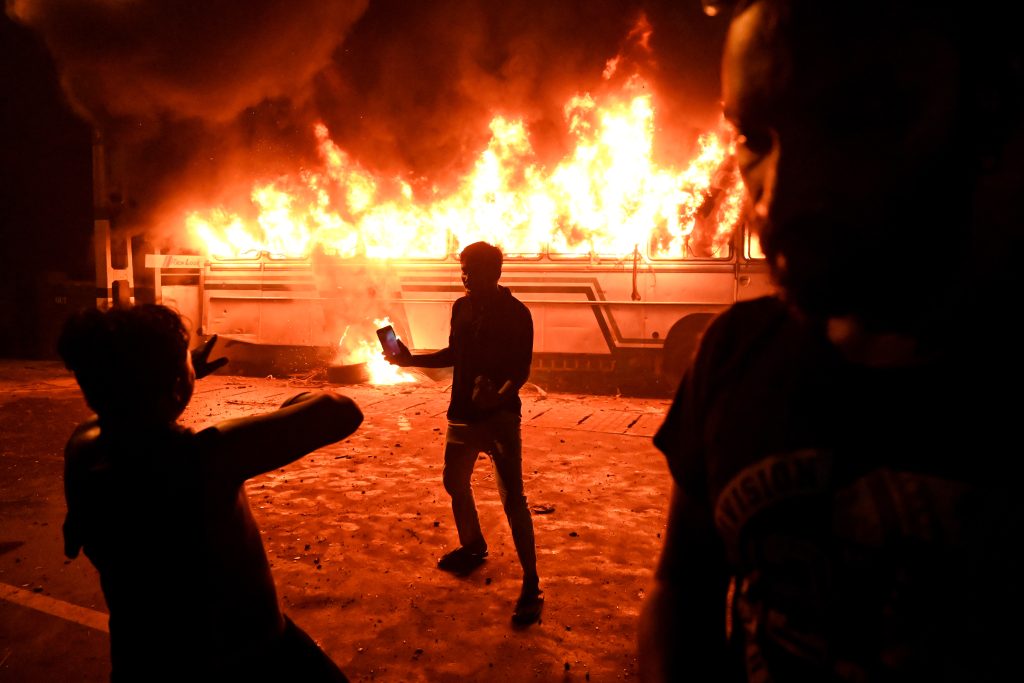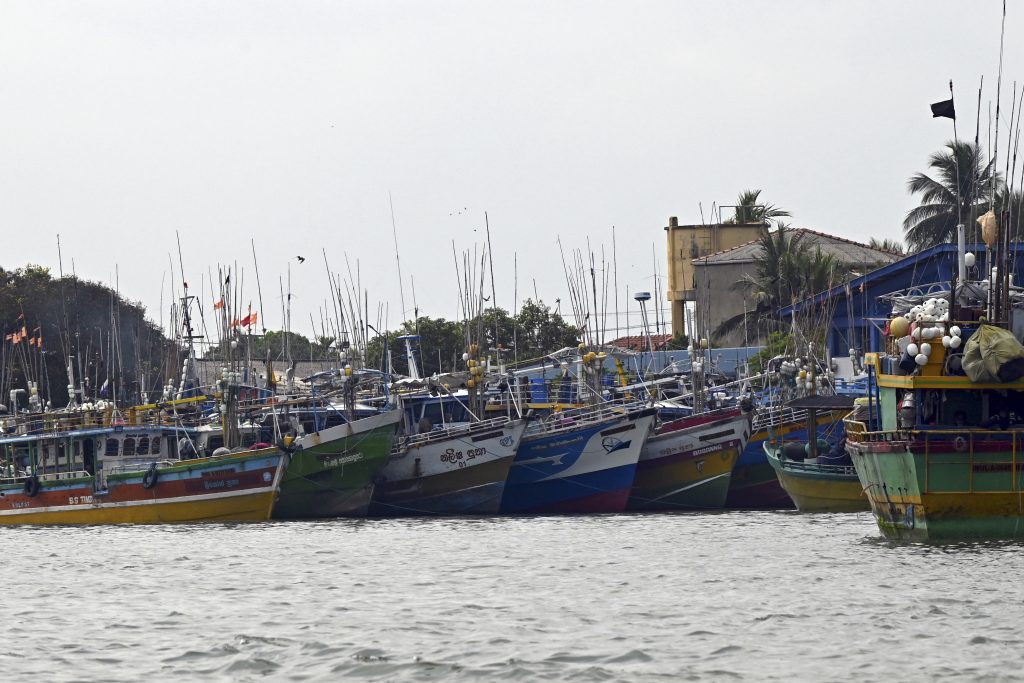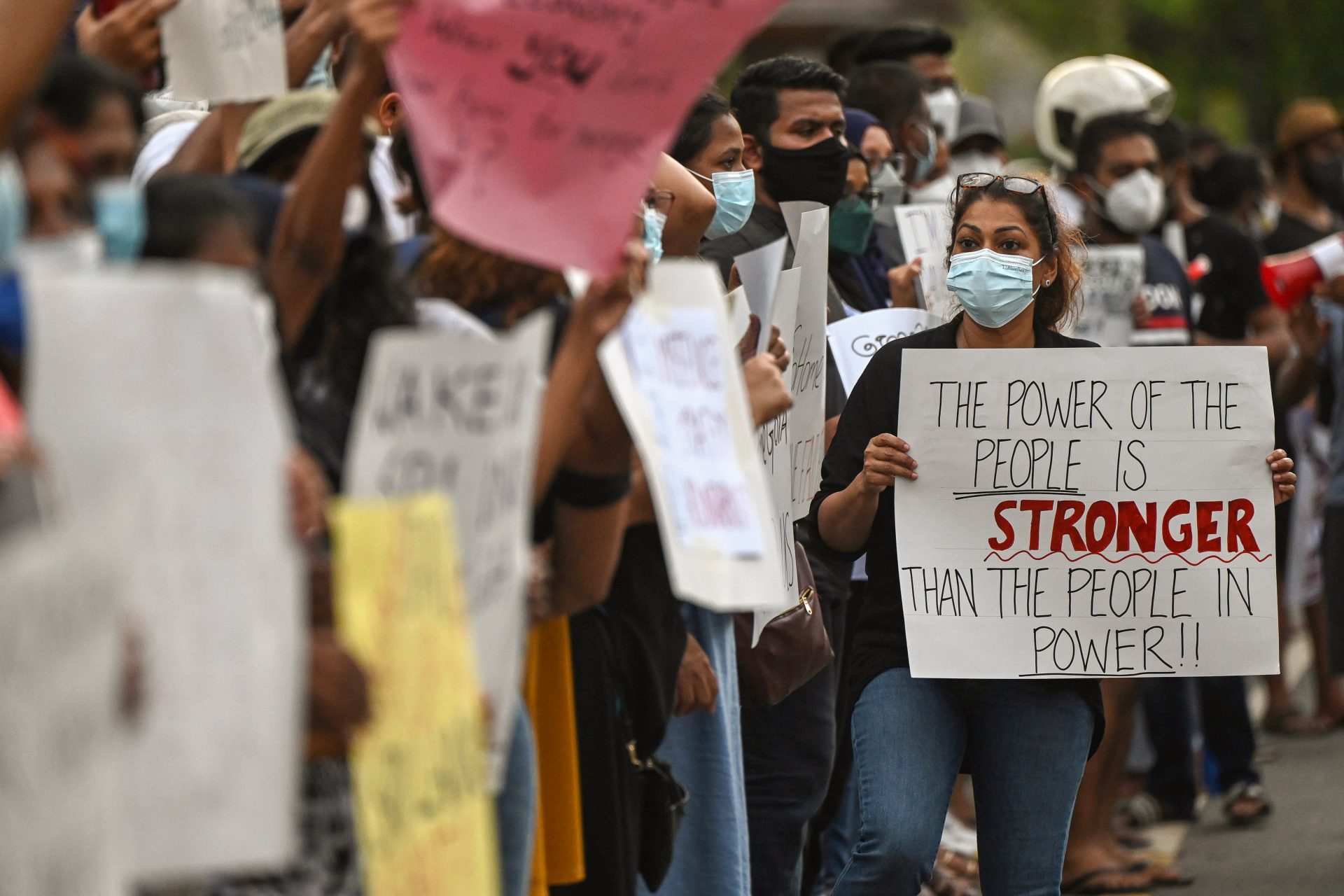Sri Lanka’s embattled president offered to share power with the opposition on Monday as protests demanding his resignation grew over the worsening shortages of food, fuel, and medicines.
President Gotabaya Rajapaksa’s invitation to legislators came as heavily armed security forces looked to quell more demonstrations over what the government itself has acknowledged as the worst shortages of essentials since independence from Britain in 1948.
“The president invites all political parties in parliament to accept cabinet posts and join the effort to seek solutions to the national crisis,” Rajapaksa’s office said in a statement.
It stressed that solutions to the deepening crisis should be found “within a democratic framework,” as thousands joined spontaneous demonstrations in cities, towns and villages.
The invitation came after 26 cabinet members — every minister except Rajapaksa and his elder brother Prime Minister Mahinda Rajapaksa — submitted letters of resignation at a late-night meeting on Sunday.
The country’s central bank governor Ajith Cabraal — who has long opposed an International Monetary Fund bailout for the country — also stepped down on Monday.
The departures cleared the way for the country’s ruling political clan to seek to shore up its weakening position.
The first nominations to the new cabinet saw the president re-appoint four of the outgoing ministers, three of them to their old jobs, while he replaced his brother Basil as finance minister with the previous justice chief.
Other cabinet vacancies will be filled after talks with the opposition, the president said.
But there was no immediate response from the opposition, which would not join any Rajapaksa-led government, according to comments Sunday by its main leader Sajith Premadasa.
Political analysts said the offer of a unity government did not go far enough to address the economic crisis or restore confidence in the Rajapaksa administration.
“This is like re-arranging the deck chairs on the Titanic,” Bhavani Fonseka, political analyst and human rights lawyer, told AFP. “This is a joke.”
Political columnist Victor Ivan added that a cabinet reshuffle in the guise of a national government would not be acceptable to people demanding the Rajapaksas’ departure.
“What is needed is a serious reform programme, not just to revive the economy but address issues of governance,” Ivan told AFP.

Church call
On Friday, April 1, the country’s Catholic bishops called on political leaders to save Sri Lanka from being a failed state amid its worst economic crisis in recent history.
In a statement, the Church leaders called for unity among politicians to save the nation from becoming a failed state.
“All successive governments to date are responsible in varying degrees for the present state of affairs,” read a statement issued by the Catholic Bishops’ Conference in Sri Lanka.
It said that “the present government as well as those in the opposition … must adopt a conciliatory not a confrontational approach” and they should not “play the blame game.”
“The country is fast approaching the precipice of a failed state that will in its wake inflict irreversible injuries on the people,” the bishops warned.
The religious leaders also urged the faithful and Church institutions to help the most vulnerable and affected groups during the economic crisis.
The country of some 22 million is facing its worst economic nightmare since its independence, with foreign exchange reserves falling by 70 percent in the past two years.
It has left the country struggling to import essential goods, such as food, fuel, cooking gas and medicine, and is causing power cuts of up to 13 hours a day.
The devaluation of its currency has sent inflation soaring to 17.5 percent in February, the highest so far, hitting the already struggling businesses and exporters but especially the people.
Earlier, Cardinal Malcolm Ranjith of Colombo blamed the country’s leaders and the people who chose them for the situation.
“Today’s dramatic and almost hopeless situation is a result of a series of seriously flawed choices made not only by our political leaders all along these years, but also by us citizens who have allowed ourselves to be used by vested political and cultural interests in choosing the persons to whom we have entrusted the country and its destiny over all these years,” said the cardinal.
He said said the country is “in a serious moral, political and economic and social crisis, attributable to a series of political choices made during this post-independence era, subservient to a narrow-minded vision concerning the new nation.”
“Over and above the subject of individual conversion in the context of the actual situation of our beloved motherland, we too need a national conversion or a new beginning as a nation,” he said.
“We need to come to our senses, understand that we have made mistakes, that a new beginning or a national conversion is very much needed,” said Cardinal Ranjith.
“All of us are in the same boat. Are we going to sink? “is the question we have to ask ourselves,” he added.
The archbishop said the situation needs the Lord’s assistance “to usher in an era of social transformation, unity, transparent honesty, equality and the rule of law a deep sense of concern for our beloved motherland and its people, especially the poor and the suffering masses.”

Power base protest
The South Asian island nation is in the grip of unprecedented food and fuel shortages along with record inflation and crippling power cuts, with no sign of an end to the economic woes.
Trading was halted on the country’s stock exchange seconds after it opened Monday as shares fell by more than the five percent threshold needed to trigger an automatic stop.
The government has announced it will seek a bailout from the International Monetary Fund, but talks are yet to begin.
Troops and police were placed on high alert as a 36-hour curfew ended at dawn despite intelligence reports warning of more unrest, a top security official told AFP.
Thousands took to the streets in the Rajapaksa bastion of Tangalle in the island’s deep south demanding the resignation of the family, police said.
Anti-Rajapaksa rallies would have been unthinkable in the region in recent years. – with a report from Agence France Presse







